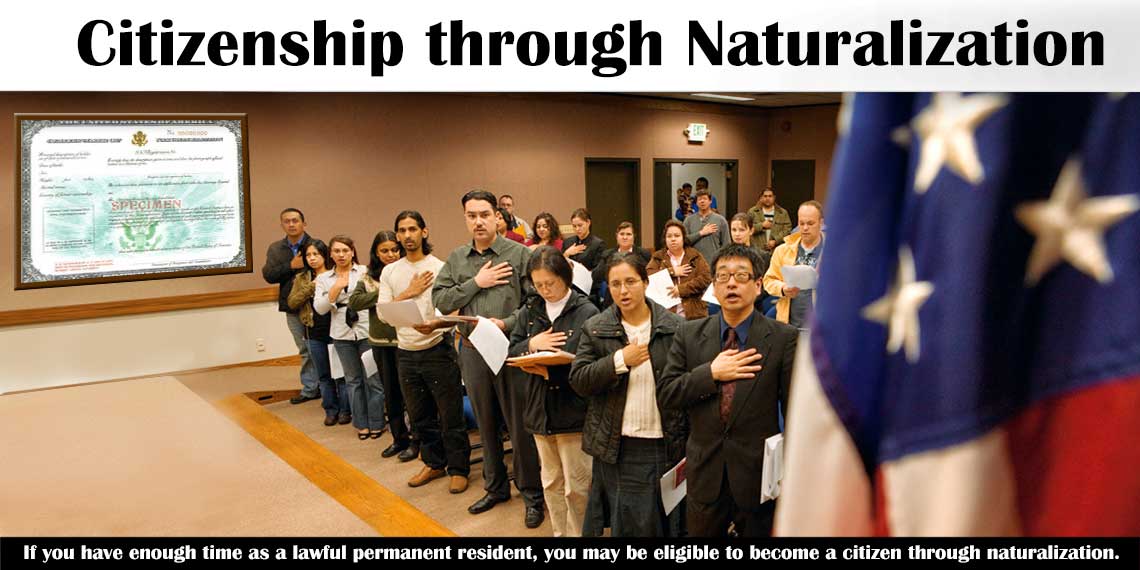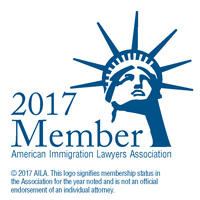Part Three of Our Citizenship Overview
Do you need help with Citizenship through Naturalization? Are you a resident of Montana, North Dakota or Wyoming? If so, you’ve come to the right place to learn about your options, you can keep reading our guide. If you know you need help and want to contact us now, you can click here.
The most common way that aliens, people not born in the United States, obtain citizenship is through the naturalization process. Naturalization is the name given to the process of requesting citizenship. The basic requirement for citizenship through naturalization is that the applicant be a lawful permanent resident. Generally, an applicant must have spent five years as a lawful permanent resident. Beside the time requirement, the applicant must have maintained residence in the United States. Those lawful permanent residents who obtain their status through marriage to U.S. citizens are eligible to apply sooner. They can apply after three years. However, the U.S. citizen spouse must sponsor them by supplying evidence of the good-faith nature of the marriage.
Naturalization Requirements
In addition to a time requirement, applicants for citizenship through naturalization must meet other requirements. These requirements are designed to screen for those lawful permanent residents who would contribute to the United States. They are also designed to screen for those who are attached to it through living here. The residency requirement discussed above means that your primary residence was in the United States for the last five years. In order to become a citizen one must also meet of physical presence requirement. You must have spent of 30 months in the US within the last five years. A period of more than six months out of the United States breaks your physical presence. An exception to this rule is if the USCIS gives you permission for more than 6 months. Without this permission, you must therefore start accruing the necessary 30 months again.
Tied to residence and physical presence requirements is the requirement about location. You may only apply for citizenship through naturalization in the state of your residence. Moreover, you must have been a state resident for 90 days. The idea of the state residency requirement is to stop applicants for citizenship from shopping for faster processing in different states. At one time the backlog citizenship in California was over two years, while processing time for citizenship in Montana was approximately six months.
Knowledge of English and Civics
An applicant of citizenship through naturalization must have a good working knowledge of English. English proficiency is tested by answering questions in English orally and in writing. The citizenship examiner is not looking for perfection of the ability to give a speech or write a novel; instead the applicant must demonstrate a simple proficiency. English skill is also tested through the applicant’s knowledge of Civics, the history of the United States, the economic principles in which it operates, and details of the political process.
Previously quite a challenge, this test is a lot easier for the applicant now that the USCIS makes model questions available on the Internet. Applicants can sit at their computers and take these tests to gauge the level of competence with the materials. Special procedures apply to long-term residents who have limited knowledge of English. Lawful permanent residents over 50 years old with 20 years as lawful permanent residents may seek exemption from the English requirement. Similarly, lawful permanent residence with disabilities that impair their learning may receive exemptions from the Civics test.
Good Moral Character
Good moral character is the last requirement of naturalization. While it might appear that good morals are difficult to define, the usual test is an absence of criminal convictions in the last five years. The USCIS will review a person’s entire criminal record and the presence of a serious crime, one that would be classified as an aggravated felony at any time will disbar the applicant receiving citizenship. In addition to criminal offenses, the USCIS will look carefully at a lawful permanent resident’s compliance with the duties imposed on residents and citizens like filing taxes.
One of the classic reasons that applications for naturalization are denied is a failure to file U.S. tax return. Sometimes this occurs because lawful permanent residents have not earned any income in the United States. However, federal tax law requires that residents of the United States must pay taxes on their worldwide income. Usually, if the USCIS sends an applicant for citizenship through the naturalization process a request for evidence relating to taxes where the applicant failed to file; the applicant can fix the problem by filing and submitting the returns.
How we can Help
If you have a simple case, your application for citizenship through naturalization can proceed smoothly even when you file without the assistance of an immigration attorney. Some clients really want to gain citizenship through naturalization, and find any bureaucracy difficult. We can help by making the process easier, and work for you.
Some clients find that the process of obtaining citizenship through naturalization uncovers problems of which the applicant was unaware, sometimes relating to residency, sometimes relating to old criminal convictions, and sometimes relating to taxes. A client may tackle the naturalization process on his or her own and then receive a denial of the N-400 after the interview. Immigration Law of Montana, P.C. can help with all these issues, and has helped many lawful permanent residents obtain citizenship through the naturalization process. Please contact us.

